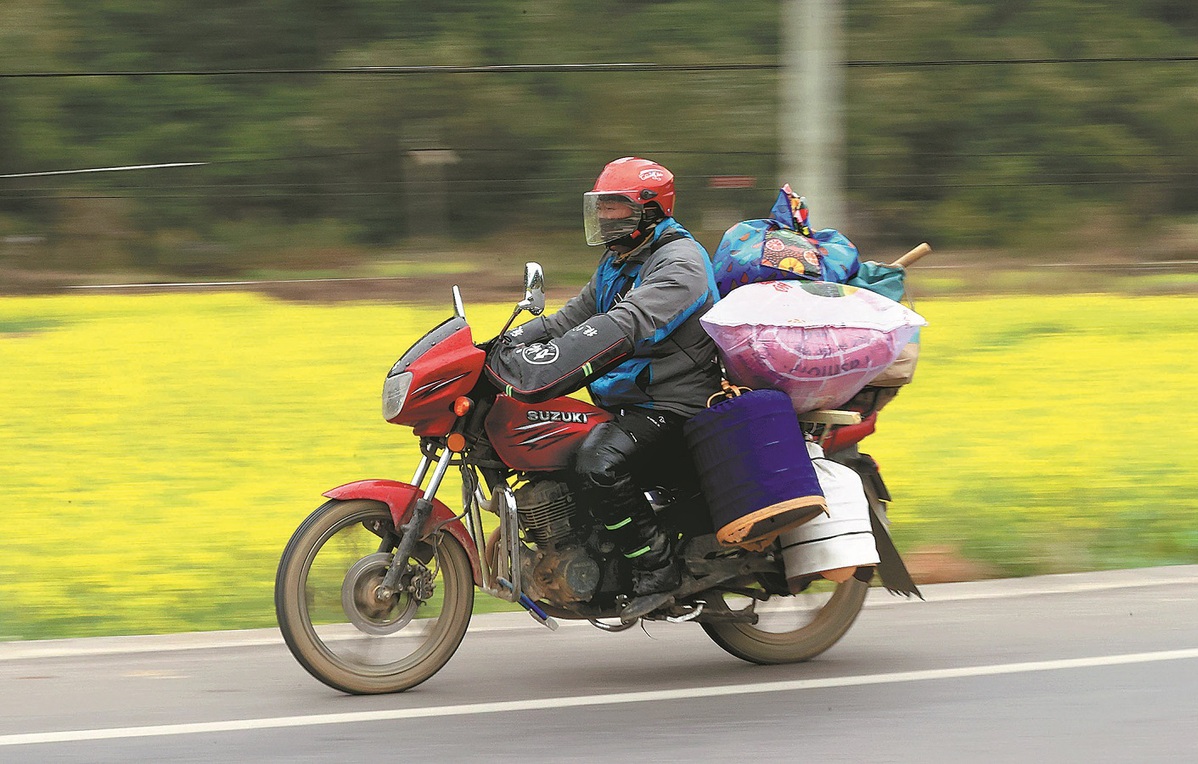Migrant workers shun motorbike trips


Hu Weihai today runs a homestay and a restaurant serving local food at his hometown in Pingxiang, Jiangxi province, after working at a furniture factory in Foshan, Guangdong province, for more than 20 years.
In the 1990s, Hu, now 51 years old, followed relatives from his hometown to Shunde in Foshan, a major furniture manufacturing hub in the Pearl River Delta region. He started as a carpenter, gradually growing into a versatile craftsman proficient in various processes such as sawing, assembly and painting.
Hu's decision to enter the hospitality business in his hometown put an end not only to his 20-year career in the furniture business, but also to the 650-kilometer journey he made home on his motorbike every Spring Festival.
"I used to return home on my motorbike with my wife and little son before the Chinese Lunar New Year as it was difficult in those days to procure train tickets," said Hu.
Hu's decision to change career was on the advice of his son, who returned to their hometown to engage in rural cultural and tourism research and development after graduating from college with a degree in design in 2022.
"The motorbike trips back to my hometown in the past years seem like a distant memory — my son wanted us to leave the path of working away from home," said Hu.
Hu's experience, from returning home by motorbike during the Spring Festival travel rush to starting businesses in his hometown, mirrors the huge change brought about by the country's rural vitalization drive over the past decades.
In 2022, the number of rural migrant workers who chose to work in their hometowns stood at 123 million, up 2.4 percent year-on-year, according to the National Bureau of Statistics. The rural vitalization drive nationwide has helped more migrant workers find employment closer home, experts said.
Meanwhile, with the development of road networks, high-speed railways and other transportation infrastructure, along with the continuous improvement in people's living standards, fewer migrant workers today choose motorbike rides to return home from Guangdong, which is home to millions of migrant workers thanks to its position as a manufacturing hub, experts said.
Statistics from China Petrochemical Corp indicate that the number of motorbike travelers hitting the highways during the annual Spring Festival travel rush has now decreased significantly to around 30,000.
Since 2013, Sinopec has been carrying out heartwarming campaigns each year to assist motorbike and truck drivers during their homebound journeys, providing free services such as refueling without charge, emergency medical treatment and vehicle maintenance.
According to data from the transportation authorities of Guangdong, the number of motorbike riders traveling from Guangdong to neighboring provinces such as Guizhou, Hunan and Jiangxi and the Guangxi Zhuang autonomous region and other areas peaked at around 1.1 million trips in 2013.
Over the weekend, as the Spring Festival travel rush got underway, hardly a handful of motorbike riders could be seen on the road from Zhaoqing in Guangdong to Guangxi. Once, the same route used to be teeming with motorbikes during the travel rush.
A few kilometers away from Wuzhou, Guangxi, 56-year-old Liu stopped to rearrange the luggage on the back of his motorbike. "Few people are making long-distance journeys home by motorbike," he said.
Liu, who works for an aluminum factory in Sihui, Zhaoqing, still commutes between his hometown and workplace by motorbike as he says "the distance is not far, and it is both convenient and cost-effective".
China's annual travel rush for the Spring Festival holiday started on Friday. This year, about 480 million passenger trips are expected to be made via the railway network, 80 million trips by air, and an unprecedented 7.2 billion trips by car during the 40-day rush, with all the figures being new highs.
- Xi delivers speech at reception held in Beijing to celebrate 75th founding anniversary of PRC
- Envoy: Fortify 'mansion' of China-US ties
- Global reporters, influencers appreciate wisdom of Confucius
- The evolution of Chinese dining tables over 75 years
- Collaboration creates symphony of progress
- Scientist honored for deep-Earth exploration efforts





































